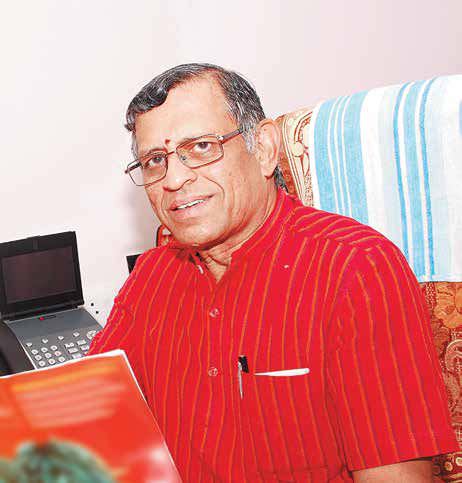In an exclusive conversation with BWBusinessworld’s Suman K. Jha, Swadeshi ideologue S. Gurumurthy talks about the Patanjali business phenomenon. Referring to the battle between desi versus foreign-grown companies, he says cultural appeal is a necessary part of the innovation of companies like Dabur, Tata, apart from Ramdev’s Patanjali. Excerpts:

Is it an unequal battle — desi companies vs foreign multinational companies, with deep pockets?
Yes it is. In more than one sense. First, we are a debt-dominated economy, where current cost of capital has to be met, whereas the MNCs are driven by equity and they can postpone returns to the investors. Second, there is so much of phoney money unrepresented by production — over $700 trillions against power money of just $7 trillions that too much of hot money is seeking instant investment opportunities. Indian capital, or banks cannot compete with that kind of cheap money. So the MNCs are generally able to out-fund, undersell, outsell and buyout desi companies. This was proved in the case of consumer durables and automobile, where Indian companies lost out huge space to MNCs.
A number of homegrown desi companies are posing a stiff challenge to foreign brands. Ola is taking on Uber; Micromax is holding on to its base in the face of an aggressive Samsung charge; and of course, we all know about the successful Patanjali forward march. Can this become the norm? Can our desi companies, through innovation, and by invoking national pride, beat the foreign competition?
I will answer it in two parts. First of all in a business like local transport, I prefer neither an global or local major. This is a business, which can be efficiently done by small operators by forming a cooperative digital networking App. The Ola and Uber model converts present and potential entrepreneurs into employees. Therefore, I do not prefer either Uber or Ola.
It is true that some desi companies are doing well, but only in select segments. That Micromax has been able to stand up to Samsung in India is a good thing. But the strength of a company domestically is important for it to become face competition outside. Samsung would not have been able to penetrate the Indian market without being strong in Korea.
هذه القصة مأخوذة من طبعة August 8, 2016 من Businessworld.
ابدأ النسخة التجريبية المجانية من Magzter GOLD لمدة 7 أيام للوصول إلى آلاف القصص المتميزة المنسقة وأكثر من 9,000 مجلة وصحيفة.
بالفعل مشترك ? تسجيل الدخول
هذه القصة مأخوذة من طبعة August 8, 2016 من Businessworld.
ابدأ النسخة التجريبية المجانية من Magzter GOLD لمدة 7 أيام للوصول إلى آلاف القصص المتميزة المنسقة وأكثر من 9,000 مجلة وصحيفة.
بالفعل مشترك? تسجيل الدخول

Technology, AI Driving Warehousing Sustainability
Anshul Singhal on how Welspun One is rapidly transforming Grade-A logistics and industrial parks across India, offering integrated fund development and asset management for large-scale warehousing solutions

DECODING RETAIL'S NEXT FRONTIER
As brands pivot towards omnichannel ecosystems and startups challenge legacy frameworks, the focus sharpens on experiential retail, sustainability and data-driven personalisation.

SORORITY OF WOMEN OF METTLE
Awinter afternoon in mid-December found quite a crowd at the Oxford Book Store on Connaught Place, as bibliophiles congregated at a corner to listen to three women authors, diverse in their passions, but drawn together by an urge to tell their story.

THE LEGACY OF THE AMARNATHS
IN NOVEMBER 2017 the management committee of the Delhi Cricket Association named the eastern stand of the Feroze Shah Kotla ground the Mohinder Amarnath stand.

PUTTING THE POWER IN THE POWERHOUSE
The Asus ExpertBook P5 is powered by an 8-core 8-thread Intel Core Ultra 7 Series 2 processor that clocks a maximum speed of 4.8 GHz, but it does not have hyperthreading. It is light weight, with a smooth glass touch pad. The laptop almost has all the I/O ports you could possibly need in a business laptop, making it an extremely lucrative option for professional computing, says

"We must be aware of our energy and water consumption"
BW Businessworld caught up with actor, philanthropist, and climate warrior BHUMI PEDNEKAR to chat about climate change and more.

"Cooking is a passport to the world"
In conversation with renowned CHEF MANJIT GILL, Advisor at Kikkoman India and President, Indian Federation of Culinary Associations (IFCA). As the former Corporate Chef of ITC hotels, Chef Gill has helped shape iconic restaurants, such as the Bukhara, Dum Pukht, and Dakshin. He has had the privilege of serving former American Presidents Barack Obama, Bill Clinton, George Bush, and the French, Canadian, British and German premiers. In 1992, Chef Gill had the opportunity of being invited to cook for Prince Charles and Lady Diana, at the Palace of the Maharaja of Jaipur. He was awarded the Lifetime Achievement Award from the Ministry of Tourism in 2007.

Strengthening Middle Management for Organisational Resilience
WHAT HOLDS AN organisation together in chaos? Is it visionary leadership, cuttingedge strategies, or robust technology?

The Retail Trailblazers
A look at companies that are making a positive impact on India's growing retail sector with their future fit business and marketing strategies.

Driving Conscious Consumerism
VIDIT JAIN, Co-founder of Kindlife, is leading the charge in revolutionising the intersection of technology and conscious consumerism.